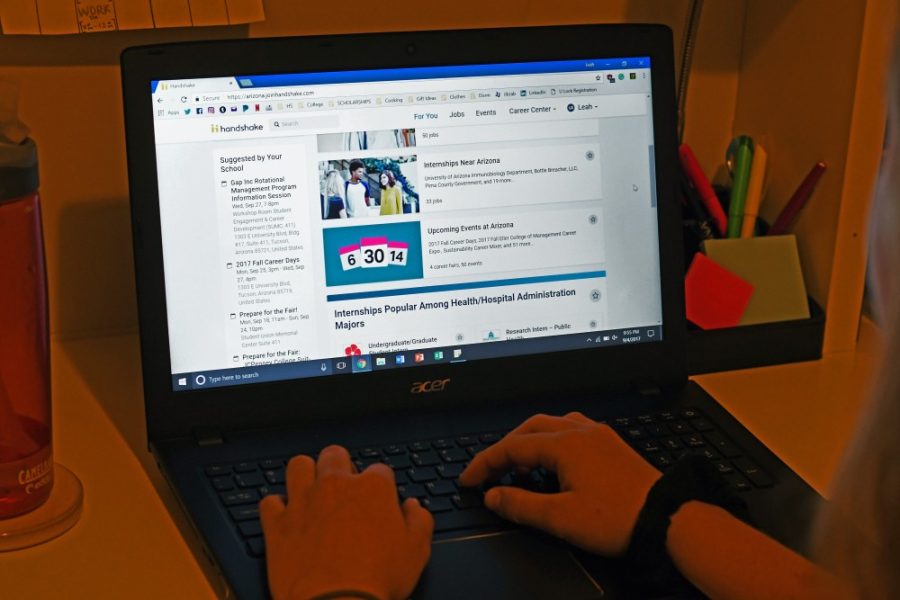October brings with it crisp leaves (or dead grass, if you’re in Tucson), cooler weather and a fresh load of stress for college students, whose new-semester giddiness has worn away into next-semester anxiety. We’re planning out our schedules, panic-booking appointments with our advisors and, for some, mass applying to internships.
Unpaid internships are a weird concept on paper. You come to a job, you do a job and then you get paid in experience. Sure, it’s a great way to build your resume and make connections, but unfortunately experience does not pay the bills. However, they’re relatively commonplace, and some majors and minors at the University of Arizona call for an internship to meet the requirements for your degree. Though the university does, for the most part, discourage unpaid internships, they still allow them to be listed on Handshake.
My thoughts? There are absolutely zero reasons for unpaid internships.
RELATED: OPINION: More schoolwork in college means less effort from students
The majority of people who have time to do work for free in exchange for experience are incredibly privileged to start with. Many college students have to work part-time jobs to pay for their tuition, books, rent, food and other necessities. Georgetown University’s Center on Education and the Workforce found that 70% of college students work — that is around 14 million working students. To be able to continue to juggle full-time school, students must choose between an internship and a job. What might be a difficult choice for some is a no-brainer for many — who chooses job experience over being able to afford rent?
From the perspective of a company or employer hiring interns, there are a lot of rules to follow if you don’t want to pay those interns. The Fair Labor Standards Act requires that unpaid interns are the primary beneficiary of the interaction, meaning that the intern must get more out of the relationship than the company or person they are interning under. Several other rules require that there is not even an implication of any kind of payment and that the work the intern does is “complementary” to paid employees as opposed to “displacing” them — so you, as an intern, are only helping employees do their work instead of doing the same work they do.
That’s a lot of rules to follow to have some random kid running around your workplace that isn’t actually contributing much. Unless you are someone whose life mission is to teach or to educate, it makes more sense to just hire a paid intern and have someone actually working. This way, you have a mutually beneficial relationship and that random kid can pay their bills.
RELATED: OPINION: The normalization of overscheduling is breaking us
Now, you might be saying to yourself, “Hey, I did an unpaid internship and I wrote blog posts for a crisp $0. How was that legal?” The answer: It wasn’t! The amount of unpaid interns whose work is wrongfully exploited by cheap employers is astronomical and difficult to report. The National Association of Colleges and Employers reported that around 40% of student internships are unpaid, and because unpaid interns are not considered employees under the Civil Rights Act, they don’t enjoy the same protection from the U.S. Equal Employment Opportunity Commission. ProPublica found that the U.S. Department of Labor also notoriously does not follow through on cases of reported exploitation of interns. It’s genuinely too easy to get away with exploiting interns’ work.
The Department of Labor Wage and Hour division’s acting director Nancy Leppink told The New York Times, “If you’re a for-profit employer or you want to pursue an internship with a for-profit employer, there aren’t going to be many circumstances where you can have an internship and not be paid and still be in compliance with the law.” Even with this acknowledgement that it is commonplace for employers to ask for free labor from interns with the “payment” of experience, the Department of Labor still does not pursue cases of underpaid or exploited labor as actively as it promises to.
Because of this employment gray area, interns are not even protected from sexual assault by the law. An intern named Bridget O’Conner had her sexual harassment case against a doctor from Rockland Psychiatry Center thrown out in 1994 almost singularly because being an unpaid intern meant she didn’t have employment rights. Being an unpaid intern means that not only are you sacrificing your sanity for wages, but you’re also sacrificing your rights as an employee, should something ever happen.
RELATED: OPINION: Vaccinations and masks are more than just political, they are common decency
If you’re debating whether to accept an unpaid internship or not, I have one last morsel of a statistic for you: there is not much discernable difference in employment rates between graduates who were unpaid interns and graduates with no internships. NACE also found in 2013 that relatively few unpaid interns received job offers as a direct result of their internship. If it’s going to come down to not being paid, you’re almost better off not doing it at all.
If you are risking your sanity, your safety and your time to accept an unpaid internship where you do not feel valued, it’s more than likely in your best interest to tell them to (politely) shove it and take that job at the coffee shop instead. Just remember: experience doesn’t pay the bills (and likely neither does minimum wage but it’ll at least buy you a textbook or two).
Follow Amanda Betz on Twitter

Mandy (she/her) is a senior studying journalism and public relations. She spends her free time shopping, writing and hanging with friends.









